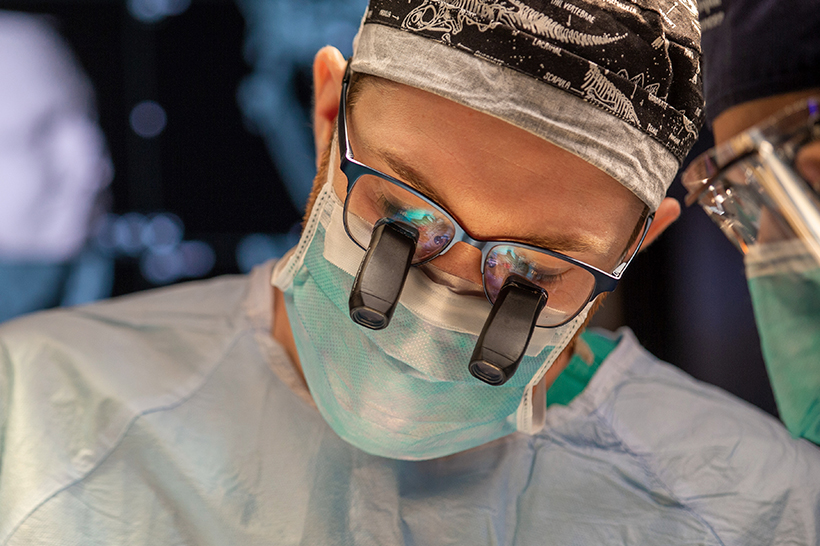
Pituitary Tumor Surgery
We use minimally invasive surgery to remove pituitary tumors with less pain and a faster recovery.
Skilled neurosurgeons and otolaryngologists work together to remove pituitary tumors using an advanced, minimally invasive procedure.
What Is Pituitary Tumor Surgery?
Open surgery is the primary approach for removing most brain tumors. The surgeon removes a small section of the skull to access the brain. For tumors in or near the pituitary gland, there’s a more direct approach called transsphenoidal hypophysectomy.
In this procedure, the surgeon removes the pituitary tumor through your nose and sinuses. Because the surgeon doesn’t go through the brain, there’s a lower risk of complications. Other benefits include:
- Faster recovery
- Less pain
- No visible scar
Types of Pituitary Tumors
Your pituitary gland sits at the base of your brain behind the bridge of your nose. Although it’s only the size of a pea, it plays a major role in your body. Hormones produced in the pituitary gland regulate many body processes, including:
- Blood pressure
- Growth
- Metabolism (how your body stores and uses energy)
- Reproduction
Pituitary adenomas are the most common type of pituitary tumor. They’re non-cancerous, so they don’t spread to other tissues. However, they can affect pituitary function and press on nearby tissues, causing significant symptoms.
Cancerous pituitary tumors (pituitary carcinomas) are very rare. When they do happen, they can spread to the brain, spinal cord and (less often) other organs.
Other types of skull base tumors can also occur in the pituitary region:
- Craniopharyngiomas: Rare, slow-growing, non-cancerous tumors that develop near the pituitary gland
- Meningiomas: Common, usually non-cancerous brain tumors that occur in the tissue that surrounds the brain and spinal cord (meninges)
- Metastatic tumors: Tumors that spread to the brain from cancer somewhere else in the body
- Rathke’s cleft cysts: Fluid-filled sacs (cysts) that grow between the two lobes of the pituitary gland
Transsphenoidal hypophysectomy is usually an option for small pituitary adenomas and other tumors in the pituitary region. Large or complex tumors typically require open brain tumor surgery.
What Happens During Transsphenoidal Hypophysectomy?
The surgical team typically includes:
- Neurosurgeon: Neurosurgeons perform surgery to treat conditions of the brain, spinal cord and nerves.
- Otolaryngologist: Otolaryngologists (head and neck surgeons) treat ear, nose and throat conditions using a wide range of methods, including surgery.
The main tool we use is a thin, lighted tube with a camera at the end (endoscope). The camera helps the team navigate inside the narrow passages behind your nose.
Before surgery starts, you receive general anesthesia. Once you are asleep, the team:
- Inserts the endoscope into your nose and guides it to the back of your sinus cavity
- Makes a small opening in the sphenoid bone separating the sinuses from the pituitary region
- Uses small tools to remove the tumor
Your team will attempt to remove the entire tumor. If a tumor has grown into nearby tissues, removing the entire tumor may not be possible. However, removing only part of the tumor often improves symptoms.
Risks of Transsphenoidal Hypophysectomy
The risks of this surgery are low. The main risk is damage to the pituitary gland. If that happens, you may need hormone replacement medications to maintain important body functions. Endocrinologists at Memorial Healthcare System manage these treatments.
Postoperative Care
After surgery, we transfer you to the neurocritical care unit to recover. This area features advanced technology and highly trained doctors, advanced practice providers and nurses. Around-the-clock monitoring in neurocritical care helps us quickly detect and treat any complications.
Pituitary Tumor Surgery: Why Choose Memorial Neuroscience Institute?
Patients and families around South Florida turn to us for advanced surgical care for brain tumors, including transsphenoidal hypophysectomy. As a leading health system in the region, we offer:
- Surgical expertise: You receive care from fellowship-trained neurosurgeons and otolaryngologists. They have extensive experience removing simple and complex pituitary tumors and a track record of exceptional patient outcomes.
- Commitment to quality: Neurosurgeons meet routinely to discuss cases and review treatment plans. They share their expertise and strategies to improve the overall safety and success of neurosurgery.
- Dedicated point of contact: Your care team includes a navigator to guide you and your family through surgery and recovery. They are available to answer questions and help you work through any issues that might arise.
- Compassion and support: We work with you to develop your treatment plan. Before surgery, we help you understand what to expect. After surgery, our team is by your side, providing personalized care, support and guidance.
- First-class cancer care: In the unlikely event a pituitary tumor is cancerous, you have access to comprehensive services at Memorial Cancer Institute. You’ll find a multidisciplinary team of specialists delivering today’s latest treatments.







